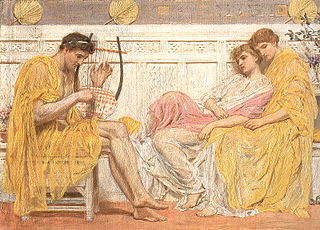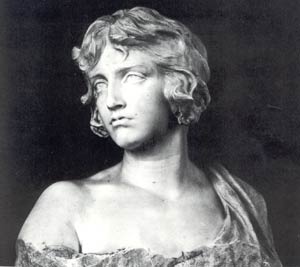 W
WThe Greek Anthology is a collection of poems, mostly epigrams, that span the Classical and Byzantine periods of Greek literature. Most of the material of the Greek Anthology comes from two manuscripts, the Palatine Anthology of the 10th century and the Anthology of Planudes of the 14th century.
 W
WAnacreon was a Greek lyric poet, notable for his drinking songs and erotic poems. Later Greeks included him in the canonical list of nine lyric poets. Anacreon wrote all of his poetry in the ancient Ionic dialect. Like all early lyric poetry, it was composed to be sung or recited to the accompaniment of music, usually the lyre. Anacreon's poetry touched on universal themes of love, infatuation, disappointment, revelry, parties, festivals and the observations of everyday people and life.
 W
WArchilochus was a Greek lyric poet from the island of Paros in the Archaic period. He is celebrated for his versatile and innovative use of poetic meters, and is the earliest known Greek author to compose almost entirely on the theme of his own emotions and experiences.
 W
WBacchylides was a Greek lyric poet. Later Greeks included him in the canonical list of nine lyric poets which included his uncle Simonides. The elegance and polished style of his lyrics have been noted in Bacchylidean scholarship since at least Longinus. Some scholars, however, have characterized these qualities as superficial charm. He has often been compared unfavourably with his contemporary, Pindar, as "a kind of Boccherini to Pindar's Haydn". However, the differences in their styles do not allow for easy comparison, and translator Robert Fagles has written that "to blame Bacchylides for not being Pindar is as childish a judgement as to condemn ... Marvell for missing the grandeur of Milton". His career coincided with the ascendency of dramatic styles of poetry, as embodied in the works of Aeschylus or Sophocles, and he is in fact considered one of the last poets of major significance within the more ancient tradition of purely lyric poetry. The most notable features of his lyrics are their clarity in expression and simplicity of thought, making them an ideal introduction to the study of Greek lyric poetry in general and to Pindar's verse in particular.
 W
WErinna was an ancient Greek poet. She is best known for her long poem, The Distaff, a three-hundred line hexameter lament for her childhood friend Baucis, who had died shortly after her marriage. A large fragment of this poem was discovered in 1928 at Oxyrhynchus in Egypt. Along with The Distaff, three epigrams ascribed to Erinna are known, preserved in the Greek Anthology. Biographical details about Erinna's life are uncertain. She is generally thought to have lived in the first half of the fourth century BC, though some ancient traditions have her as a contemporary of Sappho; Telos is generally considered to be her most likely birthplace, but Tenos, Teos, Rhodes, and Lesbos are all also mentioned by ancient sources as her home.
 W
WEuphorion of Chalcis was a Greek poet and grammarian, born at Chalcis in Euboea about 275 BC.
 W
WGregory of Nazianzus, also known as Gregory the Theologian or Gregory Nazianzen, was a 4th-century Archbishop of Constantinople, and theologian. He is widely considered the most accomplished rhetorical stylist of the patristic age. As a classically trained orator and philosopher he infused Hellenism into the early church, establishing the paradigm of Byzantine theologians and church officials. Saint Gregory was saint patron of medieval Bosnia before the Catholic conquest when he was replaced by Saint Gregory the Great.
 W
WMimnermus was a Greek elegiac poet from either Colophon or Smyrna in Ionia, who flourished about 630–600 BC. He was strongly influenced by the example of Homer yet he wrote short poems suitable for performance at drinking parties and was remembered by ancient authorities chiefly as a love poet. Mimnermus in turn exerted a strong influence on Hellenistic poets such as Callimachus and thus also on Roman poets such as Propertius, who even preferred him to Homer for his eloquence on love themes. His work was collected by Alexandrian scholars in just two "books" and today only small fragments survive. The fragments confirm the ancient estimate of him as a "consummate poet" but also indicate that he was a "sturdier character" than the indulgent love poet he was assumed to be by various ancient commentators. Almost no reliable, biographical details have been recorded. One ancient account linked him romantically with a flute girl who subsequently gave her name, Nanno, to one of his two books.
 W
WNicander of Colophon, Greek poet, physician and grammarian, was born at Claros, near Colophon, where his family held the hereditary priesthood of Apollo. He flourished under Attalus III of Pergamum.
 W
WNossis was a Hellenistic Greek poet from Epizephyrian Locris in southern Italy. She seems to have been active in the early third century BC, as she wrote an epitaph for the Hellenistic dramatist Rhinthon. She primarily wrote epigrams for religious dedications and epitaphs. Her epigrams were inspired by Sappho, whom she claims to rival. She may have also been influenced by Erinna and Anyte. Antipater of Thessalonica included her in his canon of nine female poets.
 W
WPaul the Silentiary, also known as Paulus Silentiarius, was a Greek poet. His contemporary, the historian and poet Agathias, describes him as a rich man and a 'Silentiary' or palace official of Justinian I at Constantinople.
 W
WPlato was an Athenian philosopher during the Classical period in Ancient Greece, founder of the Platonist school of thought, and the Academy, the first institution of higher learning in the Western world.
 W
WClaudius Ptolemy was a mathematician, astronomer, natural philosopher, geographer and astrologer who wrote several scientific treatises, three of which were of importance to later Byzantine, Islamic and Western European science. The first is the astronomical treatise now known as the Almagest, although it was originally entitled the Mathematical Treatise and then known as The Great Treatise. The second is the Geography, which is a thorough discussion of the geographic knowledge of the Greco-Roman world. The third is the astrological treatise in which he attempted to adapt horoscopic astrology to the Aristotelian natural philosophy of his day. This is sometimes known as the Apotelesmatiká (Ἀποτελεσματικά) but more commonly known as the Tetrábiblos from the Koine Greek (Τετράβιβλος) meaning "Four Books" or by the Latin Quadripartitum.
 W
WSimmias of Rhodes, was a Greek poet and grammarian of the Alexandrian school, which flourished under the early Ptolemies. He was earlier than the tragic poet Philiscus of Corcyra, whose time is about 300 BC, at least if we accept the assertion of Hephaestion (p. 31), that the choriambic hexameter, of which Philiscus claimed the invention, had been previously used by Simmias.
 W
WSimonides of Ceos was a Greek lyric poet, born at Ioulis on Ceos. The scholars of Hellenistic Alexandria included him in the canonical list of the nine lyric poets esteemed by them as worthy of critical study. Included on this list was Bacchylides, his nephew, and Pindar, reputedly a bitter rival, both of whom benefited from his innovative approach to lyric poetry. Simonides, however, was more involved than either in the major events and with the personalities of their times.
 W
WTheocritus was a Sicilian poet and the creator of Ancient Greek pastoral poetry.
 W
WTimocreon of Ialysus in Rhodes was a Greek lyric poet who flourished about 480 BC, at the time of the Persian Wars. His poetry survives only in a very few fragments, and some claim he has received less attention from modern scholars than he deserves. He seems to have composed convivial verses for drinking parties. However he is remembered particularly for his bitter clashes with Themistocles and Simonides over the issue of his medizing, for which he had been banished from his home around the time of the Greek victory at the Battle of Salamis. He was also an athlete of some distinction and reputedly a glutton.